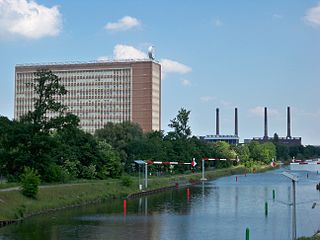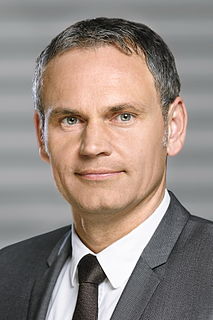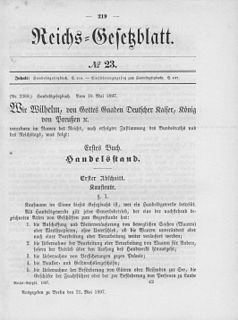Related Research Articles

Volkswagen is a German motor vehicle manufacturer headquartered in Wolfsburg, Lower Saxony, Germany. Founded in 1937 by the German Labour Front, known for their iconic Beetle, it is the flagship brand of the Volkswagen Group, the largest car maker by worldwide sales in 2016 and 2017. The group's biggest market is in China, which delivers 40% of its sales and profits. The German term Volk translates to "people", thus Volkswagen translates to "people's car".

Volkswagen AG, known internationally as the Volkswagen Group, is a German multinational automotive manufacturer headquartered in Wolfsburg, Lower Saxony, Germany. Since the late 2000s, the company is publicly traded but controlled by Porsche SE, which in turn is half-owned and fully controlled by the Austrian-German Porsche and Piëch family. The company designs, manufactures and distributes passenger and commercial vehicles, motorcycles, engines and turbomachinery, as well as offering related services, including financing, leasing and fleet management. In 2016, it was the world's largest automaker by sales, overtaking Toyota and keeping this title in 2017, 2018 and 2019, selling 10.9 million vehicles. It has maintained the largest market share in Europe for over two decades. It ranked seventh in the 2020 Fortune Global 500 list of the world's largest companies.

A Gesellschaft mit beschränkter Haftung is a type of legal entity very common in Germany, Austria, Switzerland, and Liechtenstein. It is an entity broadly equivalent to the private limited company in the United Kingdom and many Commonwealth countries, and the limited liability company (LLC) in the United States. The name of the GmbH form emphasizes the fact that the owners of the entity are not personally liable or credible for the company's debts. GmbHs are considered legal persons under German, Swiss, and Austrian law. Other variations include mbH, and gGmbH for non-profit companies.

Julius Wolff was a German surgeon.
Volkswagen Arena is a football stadium in the German city of Wolfsburg, Lower Saxony. It was opened in 2002 and named after the automotive group Volkswagen AG. The Volkswagen Arena has a capacity of 30,000: 22,000 seats and 8,000 standing places. It is located in the Allerpark and is the home stadium of the football team VfL Wolfsburg.

Dr. Ing. h.c. Rudolf Leiding was the third post-war chairman of the Volkswagen automobile company, succeeding Kurt Lotz in 1971.

Adolf Arndt was a German politician of the Social Democratic Party (SPD) and former member of the German Bundestag.

Porsche Automobil Holding SE, usually shortened to Porsche SE, is a German multinational corporation primarily known as a holding company of Volkswagen Group with investments in the automotive industry. Porsche SE is headquartered in Zuffenhausen, a city district of Stuttgart, Baden-Württemberg and is majority owned by the Austrian-German Porsche-Piëch family. The company was founded in Stuttgart as Dr. Ing. h.c. F. Porsche GmbH in 1931 by Ferdinand Porsche (1875–1951) and his son-in-law Anton Piëch (1894–1952).
Mitbestimmungsgesetz 1976 or the Codetermination Act 1976 is a German law that requires companies of over 2000 employees to have half the supervisory board of directors as representatives of workers, and just under half the votes.

German company law (Gesellschaftsrecht) is an influential legal regime for companies in Germany. The primary form of company is the public company or Aktiengesellschaft (AG). A private company with limited liability is known as a Gesellschaft mit beschränkter Haftung (GmbH). A partnership is called a Kommanditgesellschaft (KG).
Claus Roxin is a German jurist. He is one of the most influential dogmatists of German penal law and has gained national and international reputation in this field. He has been awarded an honorary doctorate by 27 universities around the world as well as the Bundesverdienstkreuz first class.
Anton Piëch was an Austrian-German lawyer and the son-in-law of Ferdinand Porsche. He headed Volkswagenwerk GmbH between 1941 and 1945, which produced the Volkswagen vehicles (KdF-Wagen) at the factory in Wolfsburg, Germany.
Claus-Wilhelm Canaris was a German jurist. Until his retirement in 2005 he was professor of Private Law, Commercial law and Labour law the University of Munich.

Ulrich Seibert is a German jurisprudent, he was head of the division for German company law and corporate governance at the Federal Ministry of Justice and Consumer Protection in Berlin until 8. 2020, and is honorary professor for economic law at the faculty of law of the Heinrich-Heine University of Düsseldorf.

Oliver Blume is a German manager and CEO of Porsche. From September 2022, he will become CEO at Volkswagen AG.

The Handelsgesetzbuch contains the core of the commercial law in Germany. It regulates the legal relations of merchants and therefore it is also designated as "the special private law for merchants".
Fred K. Prieberg was a German musicologist. He was a pioneer in the field of history of music and musicians under the Nazi regime.
The German Law on the Protection of Trade Secrets, or Trade Secrets Law in short, serves to protect business secrets against unauthorized acquisition, use, and disclosure. The law implements the Directive (EU) 2016/943 on the Protection of Trade Secrets in German law. It replaces the right to secrecy, which was previously regulated in §§ 17-19 of the Act Against Unfair Competition.
The Volkswagen Zwickau-Mosel Plant is an automobile factory, which was founded on 26 September 1990 in today's Zwickau district of Mosel and together with the Chemnitz plant and the Transparent Factory belongs to Volkswagen Sachsen based in Zwickau. Currently, the Zwickau plant has about 8,000 employees. Signalling a milestone the last combustion vehicle was produced on 26 June 2020.
Otto Heinrich Greve was a German lawyer by profession and a politician of the German Democratic Party (DDP) and its successor German State Party, the Free Democratic Party and Social Democratic Party of Germany and a member of the German Bundestag.
References
- ↑ "Gesetz über die Überführung der Anteilsrechte an der Volkswagenwerk Gesellschaft mit beschränkter Haftung in private Hand". Bundesministerium der Justiz und für Verbraucherschutz.
- ↑ § 4, Abs.3 of the above referenced law.
- ↑ F. Sander. "Case C-112/05, European Commission v. Federal Republic of Germany The Volkswagen Case and Art. 56 EC". Columbia Journal of European Law (2008). 14: 359–370.
- ↑ "Germany has complied with Volkswagen law ruling" . Retrieved 2014-07-28.
- 1 2 Barker, Alex (2013-10-22). "Germany keeps right to veto VW takeovers". Financial Times. Retrieved 2021-12-05.
- ↑ "THE VOLKSWAGEN LAW RESTRICTS THE FREE MOVEMENT OF CAPITAL" (PDF). COURT OF JUSTICE OF THE EUROPEAN COMMUNITIES. 23 October 2007. Retrieved 17 February 2013.
- ↑ "'Volkswagen law' is ruled illegal". BBC. 23 October 2007. Retrieved 17 February 2013.
- ↑ "EU To Sue Germany Again Over 'Volkswagen Law'". Wall Street Journal. 24 November 2011. Retrieved 17 February 2013.
- ↑ Ramsey (27 November 2011). "Germany in court again over "VW Law," could face fines of nearly $375,000/day". Autoblog. Retrieved 17 February 2013.
- ↑ "Germany sued for second time over 'Volkswagen law'". The Parliament. 25 November 2011. Retrieved 17 February 2013.
- ↑ "Volkswagen AG : Germany To Aggressively Defend Volkswagen Law". 4-Traders. 21 March 2012. Retrieved 17 February 2013.
- 1 2 "Germany Wins EU Court Battle Over VW Law". Bloomberg. 22 October 2013. Retrieved 5 February 2014.
- ↑ "Porsche Seeks to Acquire Share in Volkswagen". 2005-09-27.
- 1 2 Häcker, Joachim. "VW Porsche case study" (PDF).
- ↑ "VW Gains as Porsche Refinancing Boosts Expectations (Update1)". Bloomberg. 26 March 2009. Retrieved 9 June 2014.
- ↑ Connolly, Kate. "Volkswagen and Porsche to merge". The Guardian.